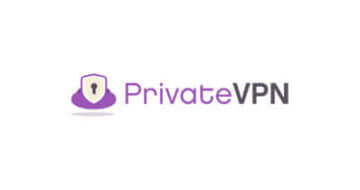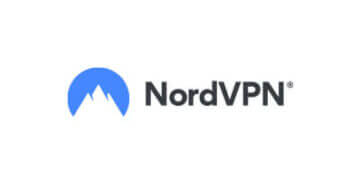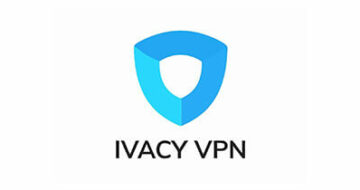Virtual Private Networks, or VPNs, have become an irreplaceable tool for millions of users across the globe. Some use VPNs in their personal lives, while others do this at work.
Basically, with the help of VPNs, computers can connect to servers located across the globe and mask their addresses. In other words, no one can see or intercept the information you share on the Internet when you use a good VPN service provider.
Over the years, people have identified multiple benefits of using a VPN. For instance, it will secure your network and hide your private information.
In this way, third parties can’t collect data or try to exploit sensitive information you share on the Internet like your home/business address, phone number, or bank account/credit card information. Of course, users can also access geo-blocked services, including streaming services (Netflix, HBO Max, Hulu, Disney+, BBC iPlayer, etc.) and websites.
Some experts claim that there are three different types of VPNs, others talk about four, but some also think there are five VPN types. None is wrong because you can classify specific types into one or more categories. In this guide, we will focus on the four most popular types of VPN.
Remote Access VPN
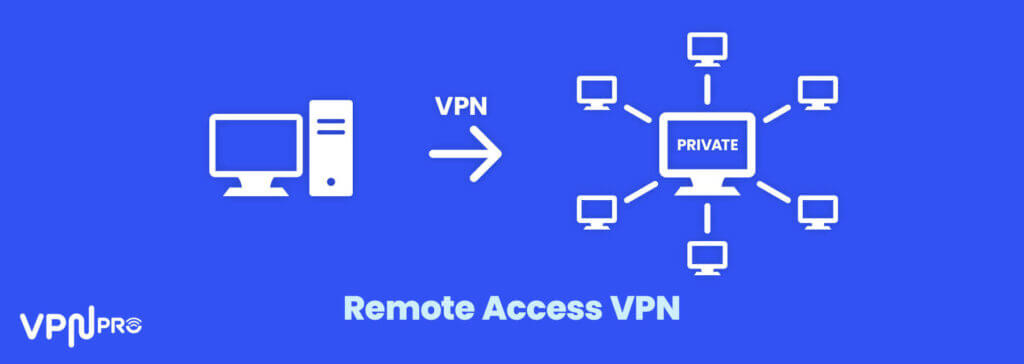
Also known as computer-to-network VPN, remote access VPN lets users connect to a private network over the Internet. For example, many individuals or companies do this to allow individuals or groups of people to connect to the company’s office network.
Over the years, we have concluded that the Internet is prone to attacks making it vulnerable to hacking. The data shared over the Internet is protected thanks to remote access VPN. The data travels from a private network and ends up in a private network.
For instance, we have an employee on his computer connected to the Internet, accessing the company’s private network. At the same time, the VPN encrypts the connection to keep the data safe as it reaches the Internet. In the end, the employee gets access to the resources in the company network with the help of the VPN service.
People usually must download client software or configure the iOS to connect to the remote access VPN. The good thing is that multiple devices can connect in this way. Users can benefit in more than one way when using a remote access VPN. For example, a remote worker can use this type of VPN to access the company’s network from the wireless Internet he uses at home.
In other words, they don’t have to travel to work to get these available files. Also, the VPN ensures the connection is secure if you use a public WiFi connection. Otherwise, you are pretty vulnerable to hackers and scammers who will compromise your company’s network and your computer or mobile device.
We should also note that more and more people use cloud storage for this purpose instead of remote access VPN. This option also gives you decent protection and is easier to use (at least at the beginning). Prospective users should analyze the cost of both options before making a decision.
Personal VPN services
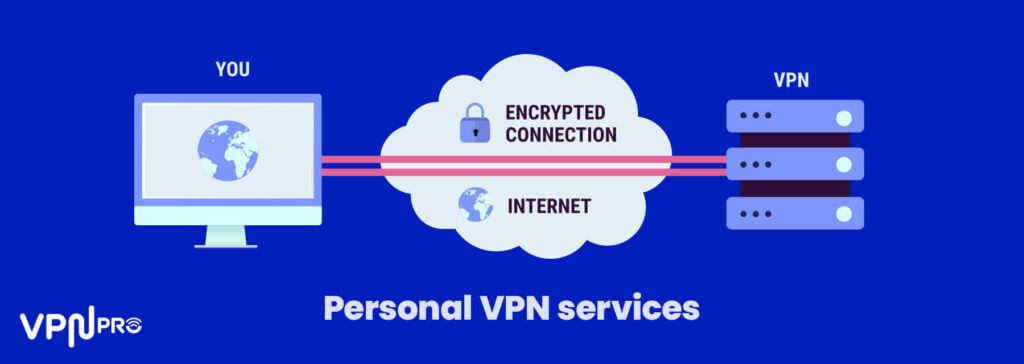
This is probably the most common type of VPN service today. With its help, you won’t access private networks but public networks with a masked address. Simply put, a personal VPN service will help you connect to a VPN server that serves as an intermediary between your device and the web. Of course, you can use this type of VPN to access streaming services, download files, and do other things online. This is the commercial/consumer variant of VPN that encrypts a user’s connection and protects its identity.
To use this VPN option, you need to connect to a VPN server (provided by a VPN service provider). From that moment, the connection is encrypted, and your real IP address is masked.
You can choose an address in a different location in the world. After that, you get access to geo-blocked sites and streaming services or simply appear as a person from another country or area. So, you can’t access a private network, but you can anonymously access websites and Internet-based services.
Of course, people use personal VPN services for many reasons. First of all, some people live in countries where access to the Internet is limited, like China and Iran. The Internet service providers block specific sites, so you can’t access them with a local IP address. When you use a personal VPN, you can skip these restrictions and access any content you want without alerting the authorities.
Also, more and more users rely on VPNs to stream their favorite TV shows and movies which are otherwise inaccessible. Due to specific regulations, online streaming services like Hulu, Netflix, or Amazon Prime are unavailable in some countries. They are present in others, but the library is not the same. The American versions of these services (primarily US-based) typically have the most extensive catalogs.
With a VPN server, you can change your address to any country you want and stream this content. Finally, users opt for personal VPN solutions to stay safe from DDoS attacks and to protect their privacy and anonymity on the Internet.
Most personal VPN solutions have specially designed apps that you can download on your computer or mobile device. Once you install these apps and log in, you can choose a server, and that’s it. Also, they have web browser extensions for those planning on using these services while browsing.
Site-to-Site VPN
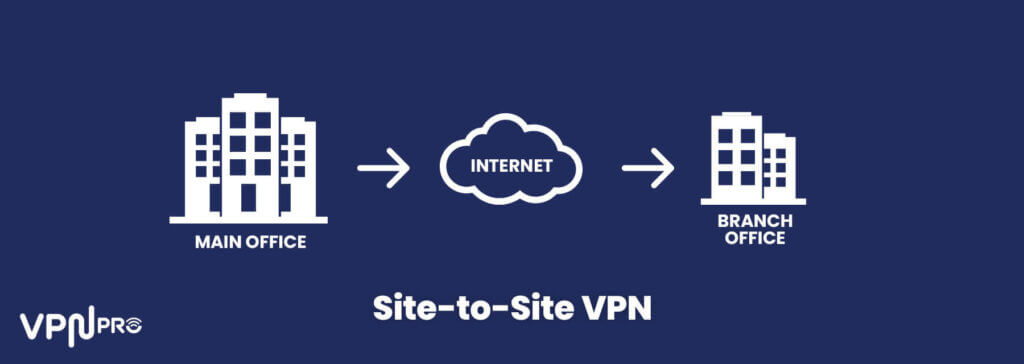
This type of VPN represents a connection between at least two networks, like a corporate network and branch office networks. Many big companies and organizations rely on site-to-site VPNs for private and secure internet connections unaffected by third-party interference.
So, in a way, it acts as cloud technology, but it adds an extra layer of privacy. This is especially helpful for organizations that have branches across the globe.
We should mention that site-to-site VPNs have much in common with remote access VPNs. Still, the main difference is that the former is permanent while the latter are temporary connections.
The popularity of site-to-site VPNs is decreasing due to the emergence of reliable cloud technology. Many cloud providers vouch for the safety of the data stored there, so handling in-house VPNs becomes inefficient and costly for most companies.
If you still have dilemmas about the usefulness of site-to-site VPNs, let’s check some of their advantages. To start with, they provide encrypted, secure connections.
You’ll still use the public Internet, but the data shared over the Internet is protected against hackers. Also, all office branches (using this type of VPN) can keep their internal addresses when communicating. There’s no need for external IP addresses. Finally, it’s easier to control what’s shared over the network, and the files that come outside the network can be filtered and blocked.
Mobile VPNs

The mobility of modern Internet users keeps increasing. Traditional VPN solutions were designed to help users mask their IP at home or work. Once they are disconnected, the link to the VPN server is terminated. With Mobile VPNs, the connection remains as long as you want to. In other words, you can have problems with your connection, WiFi signal, or your device, but the VPN connection will stay active.
In most cases, mobile VPNs are used by people with mobile devices, but they also work on desktop and laptop computers. For instance, you can use your smartphone at work to access your organization’s network. If the mobile VPN is on, the data becomes encrypted and stays this way even if you turn off your device. You can get anything you need from your company’s network through the mobile VPN.
Mobile VPNs can be beneficial in specific situations. For instance, first responders can benefit from all types of VPNs, but most will find mobile VPNs the best option. They tend to move to different locations daily. With the help of this solution, they can rest assured that the databases will remain accessible. The same goes for the people who work from their homes in places where the Internet connection is not that great. So, if the connection is poor, they can keep working.
Final Thoughts
With so many different types of VPN solutions, it’s natural to ask yourself – what type of VPN do I need? Of course, every person/organization has different needs. For example, if you need to access a private network remotely, you should use a mobile VPN or a remote access VPN. On the other hand, individual users looking for privacy, anonymity, and unblocking geo-restrictions should opt for personal VPN solutions. The site-to-site VPN is good for corporations, but those considering this option should also analyze the benefits of cloud technology.



